As an Amazon Associate I earn from qualifying purchases. Please read the disclaimer for more info.
Zanzibar, located just off the Tanzanian coast of East Africa, has a rich culture, beautiful beaches, and an abundance of flavorful spices.
Visitors to this Indian Ocean paradise can’t miss the unmistakable aroma of the spices in Zanzibar, such as cloves, nutmeg, and cinnamon, wafting in the air.
Not only are these spices native to Zanzibar and grown in abundance by local farmers and craftsmen, but they each hold a long cultural significance for those that come from Zanzibar.
I highly recommend taking a specialized spice tour of the many spice farms for enthusiasts to get immersed in the magic of these fragrant plants and learn more about how their particular flavors came to be intertwined with history.
Related: Zanzibar Travel Guide – Everything You Need Yo Know
History of Spices in Zanzibar
Spices have had a long and fascinating history in Zanzibar. Before European settlement, the area was already renowned for its extensive use of local spices due to their abundance on the island and throughout East Africa.
The importation of spices began during the era of Portuguese exploration of Africa in the 16th century. It is believed that traders from India contributed significantly to this spice trade, with cloves, black pepper, and nutmeg being the most sought-after commodities in Europe at the time.
These spices would go on to establish Zanzibar as an influential center for agriculturally based trading.
As more countries became involved in the Spice Trade, Zanzibar became a major port city connecting many nations interested in various spices from around East Africa and beyond.
Today, Zanzibar continues to be well known for its wide variety of exotic spices used both inside and outside its borders.
Related: Zanzibar Food: Street Food to Tropical Fruits
6 Zanzibar Spices to Watch For
Zanzibar’s tropical climate makes it a prime spot for growing spices. Here are 6 of the most widely produced spices in Zanzibar.
Zanzibar Cloves

Zanzibar’s production of cloves is an integral part of the archipelago’s economy. Clove production has been central to the islands’ economy for hundreds of years, and still today it remains one of their primary exports.
Cloves are incredibly versatile and have a place in many different styles of cooking. The flower buds of this tree are among the most flavorful spices found in nature, with a pungent aroma and intense flavor.
Most commonly used as an ingredient in food, cloves add sharp and spicy notes to dishes around the world.
Cloves have a deliciously warm, intense flavor with a hint of sweetness and just a slight touch of bitterness.
They don’t overpower a dish but rather enhance it with unique notes and an interesting texture.
Related: Vietnamese Spices: Discover the Secret Ingredients
Pepper

Zanzibar is a small archipelago off the coast of East Africa that produces some of the world’s highest-quality pepper. Known for its mouth-watering earthy flavor, Zanzibar pepper is handpicked from fields just outside the capital city and usually sun-dried before being packaged for delivery worldwide.
Additionally, the farmers use red volcanic soil found all over Zanzibar as a natural fertilizer to promote stronger crops. Once harvested, farmers travel to local markets where peppers are carefully inspected according to their grade.
Two varieties of pepper – black and white – are harvested for both whole spice form and ground into a fine powder.
Ginger

Ginger is grown in small plots throughout the archipelago, mostly by smaller-scale, organic farmers, with most of the production of this spice sold locally.
However, the farmers are faced with an uphill battle due to weather and pests that can wreak havoc on crop yields. To help mitigate damage from external factors, local cooperatives have been formed to help coordinate efforts that allow farmers to support each other’s land management techniques.
Ginger production has continued to grow each year and has provided stability and self-sufficiency for families across the island.
Ginger pairs exceptionally well with both savory and sweet dishes and drinks, making ginger an incredibly versatile taste experience.
Some people liken the taste of ginger to that of a radish or wasabi, while others focus on its subtle citrus-like undertones.
Cinnamon

Zanzibar is known for its production of spices such as cinnamon. The bark from Ceylon cinnamon trees grown on the islands is harvested, cut, and dried which is then ground into cinnamon powder.
After drying, it is beaten into thin sheets or rolled into quills. The bark of the cinnamon tree has a sweet and warm flavor that complements numerous dishes.
Cinnamon powder made in Zanzibar has been recognized by chefs around the world for its potency and versatility – adding sweet warmth to cakes and coffee, or savory complexity to curries.
With a legacy spanning generations of farmers harvesting bark from their lush plantations, Zanzibar’s unique flavor continues to bring global appeal.
Cardamom

Cardamom production in Zanzibar has long been prized for its distinct and delicious flavors. Known to be the after saffron and vanilla the third most expensive spice in the world, cardamom produced in Zanzibar is known for its warmly spicy and sweet flavor with a hint of citrus.
This unique flavor can be credited to the location of Zanzibar off the coast of Africa, as it offers a special combination of opulent conditions for harvesting this fragrant spice.
Nutmeg

Nutmeg is an aromatic spice that grows in tropical areas, such as on the island of Zanzibar. Production of the spice starts with harvesting the nutmeg Myristica Fragrans tree in the spring when ripe nutmegs are found in their dried fruit and collected.
The edible seed of the nutmeg fruit is ground up to produce a fragrant, slightly sweet and spicy taste that can be used as a condiment for all kinds of savoury dishes and desserts alike.
In Zanzibar, this production makes it possible for local villagers to make a living from growing and trading this sought-after spice.
Some of its most popular uses include spicing up pies, cakes and cookies or tempering creamy soups and risotto dishes.
Tours of Spice Plantations
Touring a local spice farm on ‘Spice Island’ is the perfect way to gain a deeper appreciation of the Zanzibari spices that have been cultivated on the island for centuries.
Visitors can witness how each spice, as well as fruit, is grown and processed by exploring Zanzibar’s beautiful landscape.
Moreover, the vibrant colors, fragrant smells, and bountiful harvests will transport visitors back in time to when these spices were first introduced in the area.
While on these spice tours, knowledgeable guides can provide insight into the history and production of these spices, giving travelers a memorable and enriching experience from start to finish.
Related: Top 20 Fruits in Zanzibar
Zanzibar Spice Tour

There are many options for a spice tour in Zanzibar. These can be found online, through your accommodation, or via the numerous offers you will receive from taxi drivers or random strangers.
A spice tour, and buying spices, are an integral part of the tourist industry in Zanzibar.
A typical spice tour will include a visit to the main market in Stone Town, and a visit to a Spice Plantation, before enjoying lunch at a local restaurant.
You can read more about the specific tour here.
Or you can access information on other Zanzibar tours here.
Zanzibar Spices in Cooking

Spices are a great way of enhancing food’s flavor without adding in extra calories or sugars.
For example, adding cinnamon to a stew or curry will provide subtle sweetness and complement other ingredients.
Nutmeg adds a pleasant touch of sweet, warm flavor to many dishes with nutmeg’s versatility making it useful for flavoring everything from ice cream to pumpkin pie lattes and chai spice teas.
And, cloves are a unique and flavorful spice that can make any meal more interesting. For example, adding a few whole cloves to simple olive oil will yield a richly fragrant blend that can elevate a roasted vegetable dish in mere moments.
Spices Used for Medicinal Purposes
Spices have been used for centuries as a form of medicine due to the complexity and versatility of their flavor profiles. Some of this traditional knowledge still exists on Zanzibar island, as many spices are frequently used as healing agents.
For example, cloves and cardamom are widely recognized for their therapeutic benefits – cloves can help to reduce toothache and digestion issues while cardamom has antiseptic properties and is beneficial for respiratory health.
Touring the plantations in Zanzibar will give visitors an opportunity to explore the various methods of growing these magical spices and see first-hand how they are harvested before learning about their medicinal properties.
Zanzibar Spices Conclusion
In conclusion, Zanzibar’s spices are a unique flavor and history source. Cloves, nutmeg, and cinnamon all contribute to the delicious and varied dishes of the island.
Not only do these spices enhance food, but they also have medicinal uses that are still used in Zanzibari culture today.
Furthermore, taking a spice plantation tour is a great way for visitors to learn more about these treasured ingredients and the island’s vibrant culture.
The cultural significance of spices in Zanzibar can’t be overstated – from their flavoring of foods to their use as medicine, these spices are truly essential components of life in Zanzibar.

